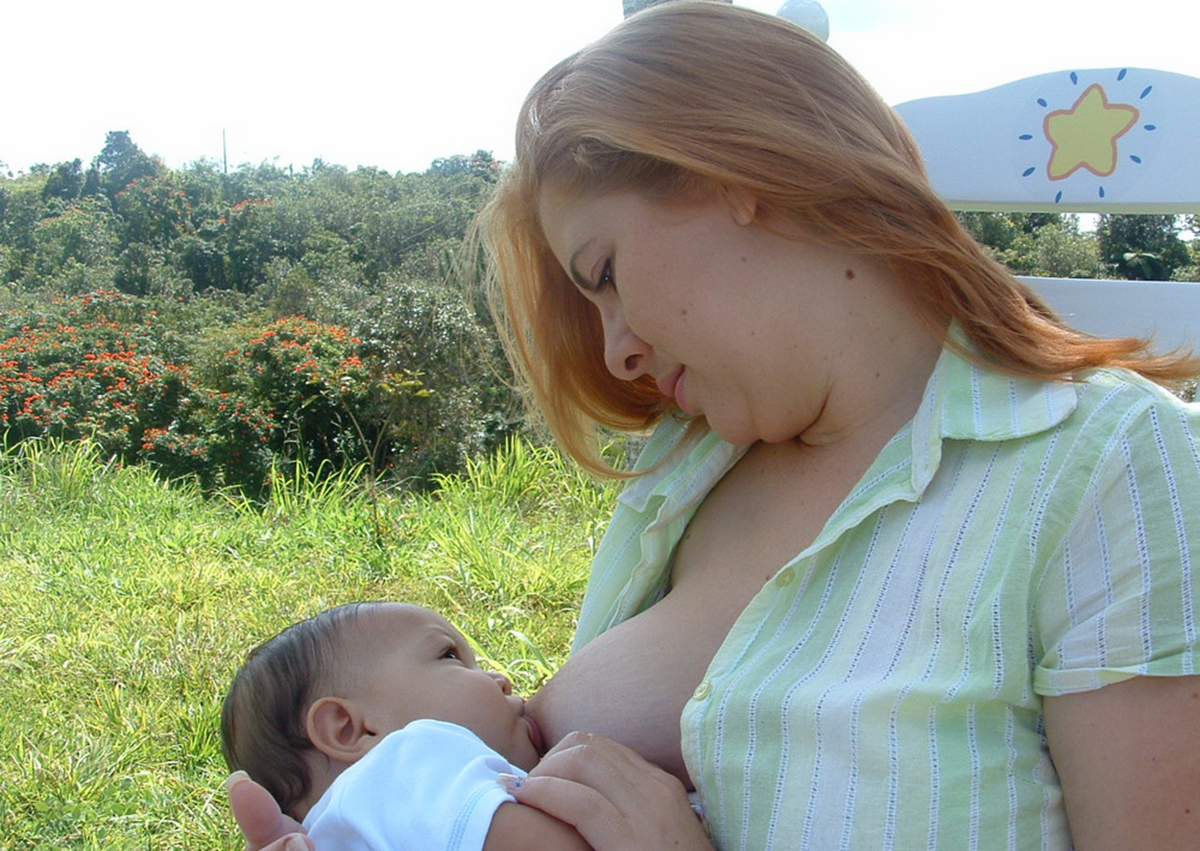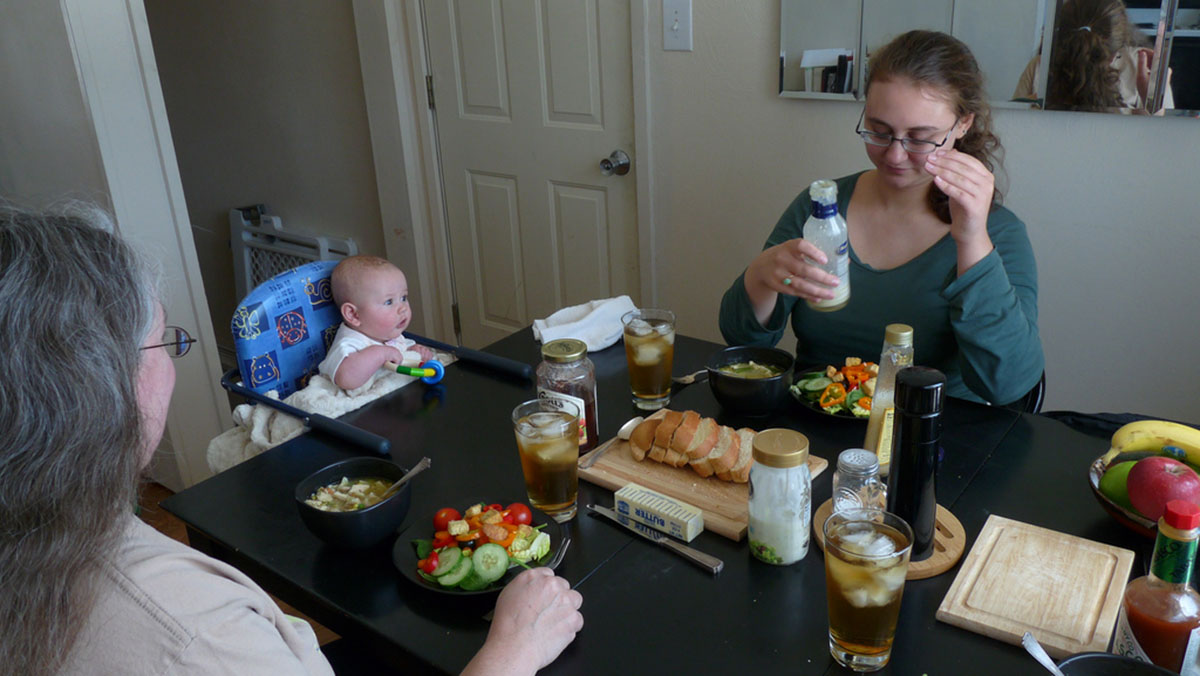Breastfeeding offers significant benefits to both mothers and babies. Not only does your milk change to meet your baby's nutritional needs throughout the time you nurse her, but it also offers disease-fighting antibodies. Breastfeeding reduces a mother's odds of developing breast cancer later in life, and has even been shown to bring a child's risk of obesity down while adding to his IQ points.

Yet, you often hear that "it's a bit more of a hassle than formula feeding". As a mother who nursed her two kids for a total of four years, I really don't understand that concept — even the thought of getting up at night to sterilize bottles and prepare formula is exhausting. The whole thing becomes clearer if you look at the amount of advice you'll get about what to eat and what to avoid while breastfeeding.
"What to avoid while breastfeeding" lists can be awfully long. According to some of these lists, you should steer clear of coffee, corn, peppers, garlic, eggs, peanuts, parsley, cauliflower, broccoli, and even chocolate. And alcohol, of course. And that's only the start. You'll probably also hear that you have to go out of your way to eat certain foods while breastfeeding, or you will produce poor-quality milk. Let's take a look at some of the most common questions about maternal nutrition while breastfeeding, and figure out what is true and what is scare-mongering.
Do Breastfeeding Mothers Need More Calories?
Nursing uses up between 300 and 500 additional calories a day. Have you ever heard moms complain that they can't seem to lose the extra weight they put on during pregnancy after they had their babies? Breastfeeding mothers who do not increase their calorie intake will naturally start to lose the fat stores they may have built up while they were expecting. Simply said, it isn't usually necessary to increase the amount of calories you consume while you are nursing. In fact, nursing can help you lose the pregnancy weight you so desperately want to get rid of.
It isn't even necessary to count calories while you are nursing. I never did, and it is undeniable that many humans throughout history had no idea how to do that or what calories even were.
Research has shown that breastfeeding mothers can actually safely go on a weight-loss diet. The advice is to weight until your baby is at least two months old and your milk supply has been well established. After that, it is perfectly safe to lose up to a pound and a half a week through a combination of limiting calories and exercising regularly. Nursing mothers who are interesting in limiting their calorie intake should do so gradually, rather than all at once. Nobody should go below their recommended daily amount of calories, of course.
Underweight nursing mothers may benefit from increasing their calorie intake, and they should talk to their family doctor or a nutritionist for concrete advice.
What Is The Ideal Diet For Breastfeeding Moms?
The ideal diet for breastfeeding moms doesn't differ from the ideal diet for most people. Most people do not eat an ideal diet, however, and nursing a baby is a good opportunity to reexamine what you eat — something you might already have done during pregnancy anyway. The ideal diet includes plenty of fresh fruits and vegetables, various grains, sufficient amounts of protein and some fat too. Vegetarians and vegans can absolutely breastfeed without any problems, but they should watch their protein intake.
Besides making sure that the foods a nursing mom eats are healthy, she should try to eat a varied diet that includes as many different foods from the food groups above as possible.
See Also: How to Increase Lactation and Breastfeeding with Herbs and Diet
What About Fluid Intake?
It's important to stay well hydrated while you are breastfeeding. Many people tend to forget to drink enough water, so always having a bottle of water on the go can really help. If you have trouble remembering to drink enough, you could try drinking a glass of water whenever you nurse your baby.
Are There Any Foods You Should Avoid While Breastfeeding?
Research shows that flavors are already passed on from mother to baby during pregnancy. Babies constantly ingest small amounts of amniotic fluid, which take on the flavors of foods their mothers ate. If you were a fan of garlic during your pregnancy, it's unlikely that your baby will have trouble with it when you nurse her.

In short, there isn't a list of foods that all nursing moms should definitely avoid. If you have a family history of allergies, you may want to avoid those potential allergens. Otherwise, you can eat anything as long as you notice a reaction in your baby. Keep an eye out for sudden episodes of crying and bodily twitching, which could alert you to the possibility that your baby might be sensitive to some of the foods you eat. Diarrhea, sometimes in weird colors, is another symptom that should trigger you to take a closer look at your diet.
There is no reason to avoid garlic and spicy foods, including peppers, unless you do notice a reaction. Foods that have a reputation for being gassy are also usually OK. The fact that these foods lead to gas in you doesn't mean your baby suffers the same fate if you eat them, because breast milk uses the nutrients that pass into your blood stream.
Citrus fruits are often on the "avoid" list for nursing moms as well. They don't make your milk extra acidic, but some babies are sensitive to the proteins they do get from these fruits through your milk. If your baby is sensitive, you'll definitely notice.
There are some foods and beverages you want to be careful with when you breastfeed, however.
Most babies do fine if their moms drink coffee in moderation — which means no more than two to three cups, and not huge ones. There is evidence to suggest that babies who drank some coffee during pregnancy are less likely to be sensitive to caffeine in their milk, and that babies generally become less sensitive to caffeine with age.
That doesn't mean you can drink coffee all day long, but it does mean you can enjoy your morning coffee without feeling guilty.
See Also: Breastfeeding Your Baby: Why Breast Is Still Best
Alcohol requires more caution. Some doctors recommend pumping and dumping while you wait for the alcohol to leave your system, which is usually two to three hours. Others say drinking two beers or a glass of wine is perfectly OK. Some breastfeeding advocates hold that you can safely breastfeed if you can safely drive. Since only very minimal amounts of alcohol are compatible with driving, this approach makes some sense.
There is one final suspect food we should mention, and that's fish. It's not because raw or undercooked fish can cause infections, which is the concern during pregnancy, but rather because many types of fish contain large amounts of mercury these days. Catfish, shrimp, salmon, and canned light tuna are low-mercury fish that will give you and your baby the benefits of omega-3 fatty acids while minimizing the risks.
- Photo courtesy of Carin by FreeImages : www.freeimages.com/photo/266172
- Photo courtesy of Christopher, Tania and Isabelle Luna by Flickr : www.flickr.com/photos/the_luna/3399884491


Your thoughts on this